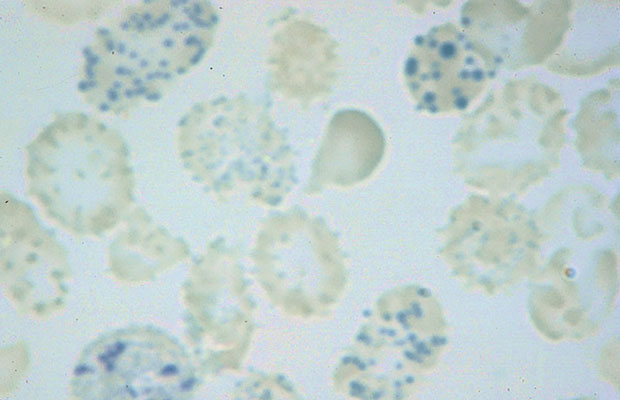At-home nasal flu vaccine, syphilis test approved
This column reviews recent recalls, alerts, and approvals.
Recalls and warnings
A class I recall updating instructions for the ClotTriever XL catheter due to serious adverse events caused when the device becomes entrapped or blocks the lung arteries. There have been four reported injuries and six deaths.
A class I recall of paraPAC plus P300 and P310 ventilators by Smiths Medical due to the possibility that the patient outlet connector may loosen or detach, causing extended interruption of therapy, no ventilation, delay of therapy, and reduced tidal volume. There has been one reported injury and one death.
A class I recall of RMU-2000 ARM XR chest compression devices by Defibtech, LLC, due to a problem with the device's motor that may cause it to stop compressions. Use may cause serious adverse health consequences, including patient injury, delay of therapy, or death. There has been one reported injury and one death.
A class I recall of one lot of the Ivenix LVP primary administration sets by Fresenius Kabi due to a manufacturing defect that may cause uncontrolled medication flow. Use of the affected product may cause serious adverse health consequences, including medication overdose and death. There have been two reported injuries.
A class I recall of certain McGrath MAC video laryngoscopes and updated use instructions for others due to the possibility that the battery may deplete below its designed threshold. If this occurs, it increases the risk of battery instability and may lead to increased battery temperature and explosion. There has been one reported injury and no reports of death.
A class I recall updating instructions for the Vivo 45 LS by Breas Medical due to potential elevated formaldehyde levels in newly manufactured ventilators. There have been no reported injuries or deaths.
Expansion of a class I recall by B. Braun Medical Inc. to include the Infusomat space infusion system/large-volume pump, due to the risk that an alarm may indicate a blockage when no occlusion exists. This will cause the pump to stop delivering medications, including critical high-risk medications. The recall is a correction, not a product removal.
A recall of certain FreeStyle Libre 3 sensors because they may provide incorrect high glucose readings. There have been two reported injuries.
An urgent medical device notification about certain Bivona tracheostomy tubes. If the flange on the item is torn or broken, the tracheostomy tube may not stay in position in the trachea. This can lead to tracheostomy displacement or decannulation. Either event may result in an inability to properly ventilate or protect the airway and may contribute to a catastrophic adverse event.
A drug safety communication warning that fezolinetant (Veozah), used to treat hot flashes due to menopause, can cause rare but serious liver injury. If there are signs and symptoms suggesting liver injury, stopping the medicine could prevent worsening liver injury and potentially return liver function to normal. The FDA recommends increasing the frequency of liver function testing.
A voluntary recall of voxelotor (Oxbryta) by Pfizer because recent data indicate its benefit does not outweigh the risks for the sickle cell patient population. In postmarketing clinical trials, the company reported a higher rate of vaso-occlusive crises in patients with sickle cell disease receiving voxelotor compared to placebo. There were also more deaths in the treatment group than in the placebo group.
A safety communication about the increased risk of postoperative periprosthetic femoral fracture with the use of the Zimmer Biomet CPT hip system femoral stem 12/14 neck taper because those who received it had an elevated risk of fracture around the thigh bone (approximately 1.4% compared to approximately 0.6% to 1% in other devices).
A recall of a single batch (2310083) of atovaquone oral suspension, 750 mg/mL, manufactured by CoreRx, Inc., and distributed by Bionpharma Inc., due to contamination with Cohnella bacteria. No adverse events related to this recall have been reported.
A warning to not use SnoreStop Nasal Spray, distributed by Green Pharmaceuticals Inc., due to potential microbial contamination.
Miscellaneous
A revision to the emergency use authorization for pemivibart (Pemgarda), used as pre-exposure prophylaxis for COVID-19, to limit its use to when the combined national frequency of variants with substantially reduced susceptibility to pemivibart is less than or equal to 90%.
An update adding 69 authorized devices to the list of medical devices that incorporate augmented reality and virtual reality.
Approvals
A change in the approval of FluMist to allow self- or caregiver administration for the prevention of disease caused by influenza virus subtypes A and B in individuals 2 through 49 years of age. The nasal spray was initially approved in 2003 for individuals 5 through 49 years of age, and in 2007, approval was expanded to include children 2 through 5 years of age. A prescription is still required, and caregivers administering the spray must be at least 18 years of age or older.
A new indication for ACAM2000 to include the prevention of mpox disease in those at high risk for mpox infection. ACAM2000 has been approved since 2007 for the prevention of smallpox disease in individuals determined to be at high risk for smallpox infection. ACAM2000 is a live replicating vaccinia virus vaccine. Every person who receives ACAM2000 is required to receive the medication guide approved by the FDA.
Emergency use authorization of an updated version of the Novavax COVID-19 vaccine that more closely targets currently circulating variants to provide better protection against serious consequences of COVID-19. The updated vaccine is authorized for use in individuals 12 years of age and older. It includes a monovalent component that corresponds to the omicron variant JN.1 strain of SARS-CoV-2.
Marketing authorization of NOWDiagnostics' First to Know syphilis test, the first at-home, over-the-counter test to detect Treponema pallidum antibodies in human blood, which provides results in approximately 15 minutes. Positive results from this test alone are not sufficient to diagnose syphilis infection and should be followed by additional laboratory testing through a health care professional to confirm diagnosis. Results of this test will be positive for individuals previously diagnosed with syphilis, even if they were successfully treated.
Xanomeline and trospium chloride (Cobenfy) oral capsules to treat schizophrenia in adults. This is the first antipsychotic drug approved to treat schizophrenia that targets cholinergic receptors as opposed to dopamine receptors.
Arimoclomol (Miplyffa), an oral medication for the treatment of Neimann-Pick disease, type C (NPC). The drug, in combination with the enzyme inhibitor miglustat, is approved to treat neurological symptoms associated with NPC in adults and children 2 years of age and older. Safety and effectiveness were evaluated in a double-blind, placebo-controlled trial that randomized 50 patients 2:1 to treatment with weight-adjusted arimoclomol (31 to 124 mg) or placebo orally three times per day. Among these patients, 39 received miglustat as background treatment. Compared to placebo, arimoclomol resulted in a slower disease progression. The treatment received an orphan drug designation. Common side effects include upper respiratory tract infection, diarrhea, and weight loss.
Levacetylleucine (Aqneursa) for the treatment of neurological symptoms associated with NPC in adults and pediatric patients weighing at least 15 kg. A double-blind placebo-controlled crossover study found that on average, participants treated with levacetylleucine for 12 weeks showed a better outcome in the functional Scale for the Assessment and Rating of Ataxia score compared to when they were treated with placebo. The most common side effects were abdominal pain, difficulty swallowing, upper respiratory tract infections, and vomiting. The treatment received an orphan drug designation.
Isatuximab-irfc (Sarclisa) with bortezomib, lenalidomide, and dexamethasone for adults with newly diagnosed multiple myeloma who are not eligible for autologous stem-cell transplant. An open-label trial randomized 446 patients to receive either isatuximab-irfc with bortezomib, lenalidomide, and dexamethasone (Isa-VRd) or bortezomib, lenalidomide, and dexamethasone. Patients in the Isa-VRd arm had a 40% reduction in risk of disease progression or death. Common adverse reactions included upper respiratory tract infection, diarrhea, fatigue, and peripheral sensory neuropathy.
Ribociclib (Kisqali) with an aromatase inhibitor for the adjuvant treatment of adults with hormone receptor (HR)-positive, human epidermal growth factor receptor 2 (HER2)-negative stage II and III early breast cancer at high risk of recurrence. The FDA also approved the ribociclib and letrozole co-pack (Kisqali Femara co-pack) for the same indication. An open-label, multicenter trial of 5,101 adults with HR-positive, HER2-negative early breast cancer randomized patients to receive 400 mg of ribociclib with a nonsteroidal aromatase inhibitor (NSAI) or a NSAI alone. Invasive disease-free survival at 36 months was 90.7% in the ribociclib plus NSAI arm and 87.6% in the NSAI arm.
Axatilimab-csfr (Niktimvo), a colony-stimulating factor-1 receptor-blocking antibody, for the treatment of chronic graft-versus-host disease after failure of at least two prior lines of systemic therapy in adult and pediatric patients weighing at least 40 kg. In a randomized, open-label trial, overall response rate was 75% in the 79 patients treated with the recommended dosage. Common adverse reactions included increased aspartate aminotransferase levels, infection, and increased alanine aminotransferase levels, among others. The treatment was granted an orphan drug designation.
An expanded indication for the Insulet SmartAdjust technology, an interoperable automated glycemic controller previously indicated for the management of type 1 diabetes, to also include management of type 2 diabetes. A study in which 289 individuals with type 2 diabetes on insulin used the Insulet SmartAdjust technology for 13 weeks found that blood glucose control improved across all demographic groups compared to before the study. Adverse events included hyperglycemia, hypoglycemia, and skin irritation.
Marketing authorization of Germitec's Chronos, indicated for high-level chemical-free disinfection of transvaginal, trans- rectal, and external ultrasound probes that do not contain internal passages or any indentations or channels that are deeper than their widths.
First-time generic drug approvals
Bupivacaine liposome injectable suspension, 1.3% (133 mg/10 mL) and 1.3% (266 mg/20 mL) single-dose vials, to produce postsurgical local analgesia via infiltration in adults and regional analgesia via an interscalene brachial plexus nerve block in adults. (Brand name: Exparel)
L-glutamine oral powder, 5 g/packet, to reduce the acute complications of sickle cell disease in adult and pediatric patients 5 years of age and older. (Brand name: Endari)
Nimodipine oral solution, 60 mg/20 mL, to reduce the incidence and severity of ischemic deficits in adult patients with subarachnoid hemorrhage. (Brand name: Nymalize)
Baricitinib tablets, 1 mg, 2 mg, for the treatment of adult patients with moderately to severely active rheumatoid arthritis who have had an inadequate response to one or more tumor necrosis factor blockers. (Brand name: Olumiant)
Note: The FDA states that drugs are not always commercially available immediately after approval.





